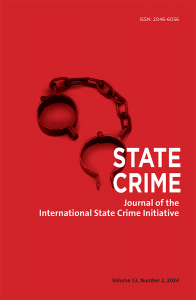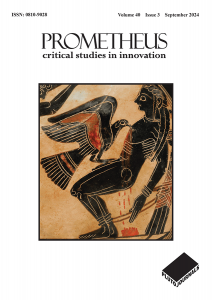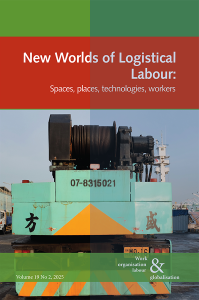Zionism, State Crime, and Sportswashing
As the Academic Year draws to a close, we wanted to highlight the Top 10 articles that we published in 2024, some early published articles from State Crime Journal, another intriguing issue from Prometheus, and a lofty tome on Logistics from Work Organisation, Labour and Globalisation.
All of our journals are Diamond Open Access, and all articles are free to read. You can view our entire collection and archive on ScienceOpen and JSTOR.
Each year we publish a list of the top 10 most read articles published in the previous year. In 2024 there is a particular focus on Palestine, Zionism and the war in Gaza.
1. Herzl’s Zionism and Settler Colonialism in Palestine
2. Abolitionism, Settler Colonialism and State Crime
3. On Love, the Palestinian Way: Kinship, Care and Abolition in Palestinian Feminist Praxis
4. Zionist Philanthropy and Palestinian Erasure: Jgive.com and the Mizrachi Organization of Canada
5. Thinking Palestine, Decolonization and Abolition in Ethnic Studies
6. Algorithmic violence: Towards an interdisciplinary understanding of bullying in academia
7. An Abolitionist Liveability Against State Carceral Unchilding Ahmad Manasra’s life-making
8. Western Domination, Destructive Governance, and the Perpetual Development Crisis in the Arab Region
9. Navigating the Tides of De-dollarization: Impact on Global Economy and BRICS Initiatives
10. The effects of the minimum wage on inequality: A literature review
 State Crime Journal, Volume 14, Issue 1 has published 2 articles early. In “Entangled Others: Intergroup Connectivity in Racialization—Israel/Palestine and Beyond” Hedi Viterbo develops a novel framework for conceptualising othering and racialisation by foregrounding an under examined phenomenon: intergroup connectivity.
State Crime Journal, Volume 14, Issue 1 has published 2 articles early. In “Entangled Others: Intergroup Connectivity in Racialization—Israel/Palestine and Beyond” Hedi Viterbo develops a novel framework for conceptualising othering and racialisation by foregrounding an under examined phenomenon: intergroup connectivity.
Utilising tax return data gathered through Access to Information requests, Miles Howe probes the Canadian charitable sector for evidence of financial complicity in the aiding and abetting of Israeli war criminality and genocide in “Tracking Financial Complicity in Israeli War Crimes and Genocide: Instances of Aiding and Abetting in the Canadian Charitable Sector”.
 In the latest issue of Prometheus – Critical Studies in Innovation, Volume 4, Issue 3, Stuart Macdonald explores the consequence of the casual approach to academic authorship in his editorial “In search of an author”.
In the latest issue of Prometheus – Critical Studies in Innovation, Volume 4, Issue 3, Stuart Macdonald explores the consequence of the casual approach to academic authorship in his editorial “In search of an author”.
The first paper “State secrets and compromises with capitalism: Lev Theremin and regimes of intellectual property” by Johanna Dahlin, is a truly remarkable piece. On the face of it, the paper is about intellectual property rights in Stalinist Russia but Dahlin focuses on a lone inventor to demonstrate the insanity of Soviet management of creativity.
In “Turning sportswashing against sportswashers: an unconventional perspective” Guillaume Detchenique and Gilles Grolleau explore how sportswashing efforts, which are meant to distract from human rights abuses and boost legitimacy, can actually be turned against those who use it to draw more attention to the very problems they are trying to hide. Roberto Cruz Romero writes about the role of openness in innovation in “As open as possible, but as closed as necessary: openness in innovation policy”.
 The latest special issue of Work Organisation, Labour & Globalisation, Volume 19, Issue 2, is titled New Worlds of Logistical Labour: Spaces, places, technologies, workers’.
The latest special issue of Work Organisation, Labour & Globalisation, Volume 19, Issue 2, is titled New Worlds of Logistical Labour: Spaces, places, technologies, workers’.
It investigates the rapidly evolving world of logistical labour, shedding new light on continuities and discontinuities in the context of technological transformation, spatial reorganisation and changing regimes of labour, migration, racism and inequality.
This important issue includes eleven articles that bring together new scholarship from Asia, Africa, Europe, North America and Oceania:
“New worlds of logistical labour: Spaces, places, technologies, workers” by Tom Barnes, Christopher O’Neill and Lauren Kelly
“The conscientious worker: Changing management conceptions of the ideal worker in warehouse labour regimes” by Tom Barnes
“Enduring inequalities: Examining sexism and gender disparities among labour and capital dynamics in container terminal work” by Victor Gekara and Darryn Snell
“Digital twins and logistical labour: Models, plans and the inversion of the ‘real’” by Zoe Horn and Michael Richardson
“South African e-commerce logistics: Reproducing racialised capitalism through warehouse work” by Bridget Kenny
“Power resources and grassroots activism: Worker organising potentials in logistics centres and online food delivery in Poland” by Adam Mrozowicki and Szymon Pilch
“The logistical episteme: Tracing the location of warehousing industries in Malaysia” by Brett Neilson and Ned Rossiter
“When algorithmic management was new: Engineered standards and the managerial prerogative in Australia” by Christopher O’Neill et al
“Logistics platforms’ ‘new’ mode of appropriation?: Ananalys is of four trends from inside Germany’s Q-commerce sector” by Harry Parfitt and Ercüment Çelik
“Remote robotics, or the digital re-embodiment of labour” by James Steinhoff, Julian Posada and Alessandro Delfanti
“The e-commerce labour regime: Amazon and beyond” by Nik Theodore and Beth Gutelius
Stay up-to-date with the latest research highlights by signing up to the Pluto Journals newsletter!

